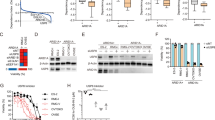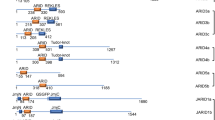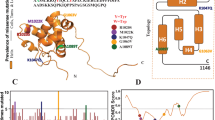Abstract
Cholangiocarcinoma (CCA) is a highly heterogeneous group of malignant tumors with different molecular etiologies and clinical manifestations. Post-translational modifications (PTM) such as ubiquitination and phosphorylation are widely involved in the progression of CCA. Our aim was to elucidate the effect of the deubiquitinating enzyme OTU domain-containing protein 3 (OTUD3) on the molecular pathogenesis of CAA. OTUD3 and ARID3A exhibit direct binding interactions and cytosolic substructural co-localization in CCA cells.OTUD3 specifically removes the ARID3A proteins K240 and K329 OTUD3 specifically removes the ubiquitinated chains at K240 and K329 of ARID3A protein, thereby enhancing ARID3A stability. OTUD3 promotes CCA proliferation and metastasis in vivo and in vitro by interacting with ARID3A.GSK3β interacts with OTUD3 protein and mediates phosphorylation of the Ser9 site of OTUD3, which enhances the affinity of OTUD3 to ARID3A and further stabilizes ARID3A protein. The expression of OTUD3 and ARID3A in CCA tissues is highly correlated, and the high expression of both proteins is closely related to the poor prognosis of patients. In conclusion, GSK3β phosphorylates OTUD3, enhances its binding ability to ARID3A, and ultimately inhibits the ubiquitination degradation of ARID3A, which promotes the progression of CCA. The GSK3β-OTUD3-ARID3A signaling pathway has been demonstrated for the first time in the progression of CCA.
This is a preview of subscription content, access via your institution
Access options
Subscribe to this journal
Receive 50 print issues and online access
$259.00 per year
only $5.18 per issue
Buy this article
- Purchase on SpringerLink
- Instant access to full article PDF
Prices may be subject to local taxes which are calculated during checkout







Similar content being viewed by others
Data availability
All data relevant to the study are included in the paper or uploaded as supplementary materials. The data and sources associated with this study are available from the corresponding author upon request.
References
Moris D, Palta M, Kim C, Allen PJ, Morse MA, Lidsky ME. Advances in the treatment of intrahepatic cholangiocarcinoma: An overview of the current and future therapeutic landscape for clinicians. CA Cancer J Clin. 2023;73:198–222.
Vithayathil M, Khan SA. Current epidemiology of cholangiocarcinoma in Western countries. J Hepatol. 2022;77:1690–8.
Kam AE, Masood A, Shroff RT. Current and emerging therapies for advanced biliary tract cancers. Lancet Gastroenterol Hepatol. 2021;6:956–69.
Valle JW, Kelley RK, Nervi B, Oh DY, Zhu AX. Biliary tract cancer. Lancet. 2021;397:428–44.
Li W, Li F, Zhang X, Lin HK, Xu C. Insights into the post-translational modification and its emerging role in shaping the tumor microenvironment. Signal Transduct Target Ther. 2021;6:422.
Chen L, Liu S, Tao Y. Regulating tumor suppressor genes: post-translational modifications. Signal Transduct Target Ther. 2020;5:90.
Guo CC, Xu HE, Ma X. ARID3a from the ARID family: structure, role in autoimmune diseases and drug discovery. Acta Pharmacol Sin. 2023;44:2139–50.
Wheat JC, Steidl U. Posttranscriptional Arid3a deregulation in AMKL. Blood. 2022;139:637–8.
Ratliff ML, Shankar M, Guthridge JM, James JA, Webb CF. TLR engagement induces ARID3a in human blood hematopoietic progenitors and modulates IFNalpha production. Cell Immunol. 2020;357:104201.
Alejo-Valle O, Weigert K, Bhayadia R, Ng M, Issa H, Beyer C, et al. The megakaryocytic transcription factor ARID3A suppresses leukemia pathogenesis. Blood. 2022;139:651–65.
Shen M, Li S, Zhao Y, Liu Y, Liu Z, Huan L, et al. Hepatic ARID3A facilitates liver cancer malignancy by cooperating with CEP131 to regulate an embryonic stem cell-like gene signature. Cell Death Dis. 2022;13:732.
Tang J, Yang L, Li Y, Ning X, Chaulagain A, Wang T, et al. ARID3A promotes the development of colorectal cancer by upregulating AURKA. Carcinogenesis. 2021;42:578–86.
Christine A, Park MK, Song SJ, Song MS. The equilibrium of tumor suppression: DUBs as active regulators of PTEN. Exp Mol Med. 2022;54:1814–21.
Du T, Li H, Fan Y, Yuan L, Guo X, Zhu Q, et al. The deubiquitylase OTUD3 stabilizes GRP78 and promotes lung tumorigenesis. Nat Commun. 2019;10:2914.
Wang M, Li Y, Xiao Y, Yang M, Chen J, Jian Y, et al. Nicotine-mediated OTUD3 downregulation inhibits VEGF-C mRNA decay to promote lymphatic metastasis of human esophageal cancer. Nat Commun. 2021;12:7006.
Xie P, Chen Y, Zhang H, Zhou G, Chao Q, Wang J, et al. The deubiquitinase OTUD3 stabilizes ACTN4 to drive growth and metastasis of hepatocellular carcinoma. Aging. 2021;13:19317–38.
Filipcik P, Curry JR, Mace PD. When worlds collide-mechanisms at the interface between phosphorylation and ubiquitination. J Mol Biol. 2017;429:1097–113.
Huang OW, Ma X, Yin J, Flinders J, Maurer T, Kayagaki N, et al. Phosphorylation-dependent activity of the deubiquitinase DUBA. Nat Struct Mol Biol. 2012;19:171–5.
Qin M, Xin Y, Bian Y, Yang X, Xi T, Xiong J. Phosphorylation-induced ubiquitination and degradation of PXR through CDK2-TRIM21 axis. Cells. 2022;11:264.
Feng X, Jia Y, Zhang Y, Ma F, Zhu Y, Hong X, et al. Ubiquitination of UVRAG by SMURF1 promotes autophagosome maturation and inhibits hepatocellular carcinoma growth. Autophagy. 2019;15:1130–49.
Li T, Wang X, Ju E, da Silva SR, Chen L, Zhang X, et al. RNF167 activates mTORC1 and promotes tumorigenesis by targeting CASTOR1 for ubiquitination and degradation. Nat Commun. 2021;12:1055.
Zhang DY, Zhu Y, Wu Q, Ma S, Ma Y, Shen ZC, et al. USP1 promotes cholangiocarcinoma progression by deubiquitinating PARP1 to prevent its proteasomal degradation. Cell Death Dis. 2023;14:669.
Liu WW, Tu JF, Ying XH, Chen ZJ, Wang YB. Postoperative survival of extrahepatic and intrahepatic cholangiocarcinoma after surgery: a population-based cohort. BMJ Open. 2022;12:e049789.
Tran TB, Ethun CG, Pawlik TM, Schmidt C, Beal EW, Fields RC, et al. Actual 5-year survivors after surgical resection of hilar cholangiocarcinoma. Ann Surg Oncol. 2019;26:611–8.
Elvevi A, Laffusa A, Scaravaglio M, Rossi RE, Longarini R, Stagno AM, et al. Clinical treatment of cholangiocarcinoma: an updated comprehensive review. Ann Hepatol. 2022;27:100737.
Ohaegbulam KC, Koethe Y, Fung A, Mayo SC, Grossberg AJ, Chen EY, et al. The multidisciplinary management of cholangiocarcinoma. Cancer. 2023;129:184–214.
Li Y, Tang J, Li J, Du Y, Bai F, Yang L, et al. ARID3A promotes the chemosensitivity of colon cancer by inhibiting AKR1C3. Cell Biol Int. 2022;46:965–75.
Mao X, Xu J, Xiao M, Liang C, Hua J, Liu J, et al. ARID3A enhances chemoresistance of pancreatic cancer via inhibiting PTEN-induced ferroptosis. Redox Biol. 2024;73:103200.
Pu Q, Lv YR, Dong K, Geng WW, Gao HD. Tumor suppressor OTUD3 induces growth inhibition and apoptosis by directly deubiquitinating and stabilizing p53 in invasive breast carcinoma cells. BMC Cancer. 2020;20:583.
Zhang P, Li C, Li H, Yuan L, Dai H, Peng Z, et al. Ubiquitin ligase CHIP regulates OTUD3 stability and suppresses tumour metastasis in lung cancer. Cell Death Differ. 2020;27:3177–95.
Jin Y, Cheng H, Cao J, Shen W. MicroRNA 32 promotes cell proliferation, migration, and suppresses apoptosis in colon cancer cells by targeting OTU domain containing 3. J Cell Biochem. 2019;120:18629–39.
Zhao M, Yang F, Sang C, Yan C, Wang Z. BGL3 inhibits papillary thyroid carcinoma progression via regulating PTEN stability. J Endocrinol Investig. 2021;44:2165–74.
Lacoursiere RE, Hadi D, Shaw GS. Acetylation, phosphorylation, ubiquitination (Oh My!): following post-translational modifications on the ubiquitin road. Biomolecules. 2022;12:467.
Murakami T, Felinski EA, Antonetti DA. Occludin phosphorylation and ubiquitination regulate tight junction trafficking and vascular endothelial growth factor-induced permeability. J Biol Chem. 2009;284:21036–46.
Zhao Y, Mudge MC, Soll JM, Rodrigues RB, Byrum AK, Schwarzkopf EA, et al. OTUD4 is a phospho-activated K63 deubiquitinase that regulates MyD88-dependent signaling. Mol Cell. 2018;69:505–16.e5.
Zhou N, Qi H, Liu J, Zhang G, Liu J, Liu N, et al. Deubiquitinase OTUD3 regulates metabolism homeostasis in response to nutritional stresses. Cell Metab. 2022;34:1023–41.e8.
Zhou A, Lin K, Zhang S, Chen Y, Zhang N, Xue J, et al. Nuclear GSK3beta promotes tumorigenesis by phosphorylating KDM1A and inducing its deubiquitylation by USP22. Nat Cell Biol. 2016;18:954–66.
Zhang S, Gao W, Tang J, Zhang H, Zhou Y, Liu J, et al. The roles of GSK-3beta in regulation of retinoid signaling and sorafenib treatment response in hepatocellular carcinoma. Theranostics. 2020;10:1230–44.
Tolosa E, Litvan I, Hoglinger GU, Burn D, Lees A, Andres MV, et al. A phase 2 trial of the GSK-3 inhibitor tideglusib in progressive supranuclear palsy. Mov Disord J Mov Disord Soc. 2014;29:470–8.
Zhang Y, Du T, Liu N, Wang J, Zhang L, Cui CP, et al. Discovery of an OTUD3 inhibitor for the treatment of non-small cell lung cancer. Cell Death Dis. 2023;14:378.
Acknowledgements
This study was supported by Anhui province health scientific research project (AHWJ2023b015), Anhui Provincial Natural Science Foundation (202308085MH271), Anhui University Natural Science Research Project (2024AH051282), the sixth batch of “special support plan” leading talent projects in Anhui Province.
Author information
Authors and Affiliations
Contributions
Deng-Yong Zhang, Wei-ying Zhao, Xiao-Lun Huang, and Zheng Lu conceived of and designed the study. Shuoshuo Ma, Yan Zhu, Deng-Yong Zhang, and Chen-yang Xu performed the main experiments, analyzed the data, and drafted the manuscript. Deng-Yong Zhang, Zhonglin Wang, Fangfang Chen, and Hui Wang helped with data analysis. Deng-Yong Zhang, Jin Shang, and Sihua Liu collected samples. Prit Benny Malgulwar assisted with drafting the manuscript. All authors read and agreed to the published version of the paper.
Corresponding authors
Ethics declarations
Competing interests
The authors declare no competing interests.
Ethics approval and consent to participate
This animal study was approved by the Animal Ethics Committee of Bengbu Medical College (No. 2021298). This study was approved by the Bengbu Medical College Ethics Committee (No. 2021230). All methods were performed in accordance with the relevant guidelines and regulations. The informed consent was obtained from all participants.
Additional information
Publisher’s note Springer Nature remains neutral with regard to jurisdictional claims in published maps and institutional affiliations.
Supplementary information
Rights and permissions
Springer Nature or its licensor (e.g. a society or other partner) holds exclusive rights to this article under a publishing agreement with the author(s) or other rightsholder(s); author self-archiving of the accepted manuscript version of this article is solely governed by the terms of such publishing agreement and applicable law.
About this article
Cite this article
Zhang, DY., Zhu, Y., Ma, SS. et al. Phosphorylation enhanced OTUD3 deubiquitination ARID3A promotes the progress of cholangiocarcinoma. Oncogene 44, 2040–2053 (2025). https://doi.org/10.1038/s41388-025-03376-2
Received:
Revised:
Accepted:
Published:
Issue date:
DOI: https://doi.org/10.1038/s41388-025-03376-2



